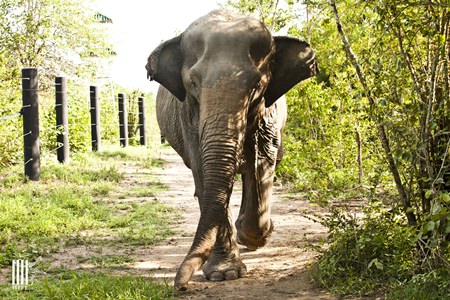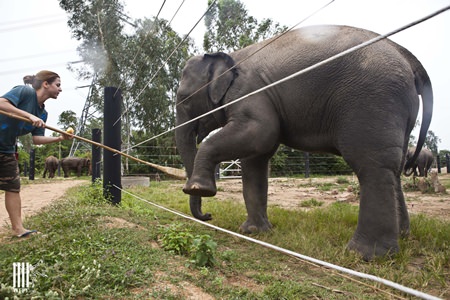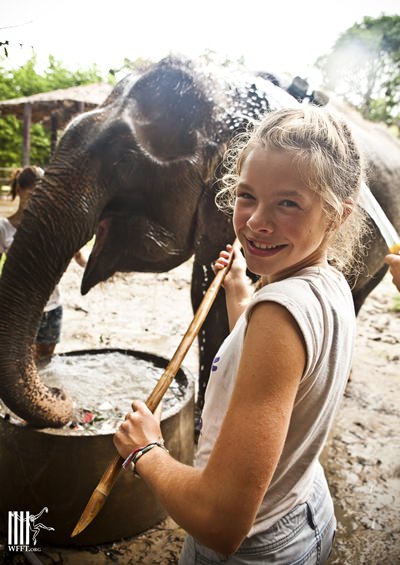The Wildlife Friends Foundation Thailand (WFFT) has a massive and critical mission: to rescue, rehabilitate, and otherwise care for wildlife that has come into human conflict, and that has been exploited or wounded.
Further goals include: educating humans – especially children – not to be cruel to animals in any way, including not using them for their own entertainment or participating in any aspect of illegal trading; preventing hunting of these animals and promoting conservation of all flora and fauna; and conducting research to be able to release rehabilitated animals into the wild.

Founded in 2001 by Dutch-born Edwin Wiek, WFFT now has over 350 permanent residents at its center on the grounds of Kao Look Chang Temple in Phetchaburi province south of Bangkok, ranging across several species lines: from bears, gibbons, macaques and civets, to jackals, lizards, and an assortment of birds. This being Thailand, however, one animal stands out and claims prominence: the great Asian elephant.
The WFFT cares for 7 elephants at present – 6 females and 1 male – between the ages of 8 and 65. The young male was rescued from the streets while all the females were rescued from riding camps, most of them in turn having worked in the illegal logging industry before that. Many were in very poor condition, with sores and open wounds caused by the seats that the tourists sit on while riding them and many were malnourished.

When a rescued elephant lands at the WFFT center, they are immediately given a thorough checkup, after which the proper course of action for each elephant is decided, including what medical care and diet is best for each particular elephant. This involves building trust with the elephant, which is also necessary for treatment.
This is where the latest training methods come in: positive reinforcement – known as target training. After preliminary assessment and care is given, the elephants are given time to settle in and rebuild their strength with the proper diet and environment, meaning: no more tourists on their backs, no more painting or kicking balls, and no more logging.
As a result of using positive reinforcement methods, the on-site vet is able to closely approach the elephants and treat the abscesses that most of the older elephants have and also give them proper trunk and nail treatment.
Elephants KhanKluey 2013WFFT wishes to convey the following message as widely as possible: please do not ride elephants at camps or centers, and do not patronize attractions where elephants are made to do tricks. These are not natural animal behaviors, and are often harmful to elephants, either in practice or through the training needed to perform these stunts.
There are camps in Thailand where tourists can visit, observe, and enjoy the company of elephants in their natural surroundings, such as at the WFFT. Positive reinforcement is provided with food and it is the elephant who decides how far to walk and when to return.
All volunteers that work with the elephants at the WFFT elephant center are aware of each elephant’s history, behavior, and personality; thus, visits are safe, respectful, and on a more equal basis between human and elephant. All elephants also have their own spacious, natural, and comfortable enclosures, and are not chained up at night, but left to roam freely within their designated domain.
Daytrip ElephantWalk26WM 310713The WFFT has created a safe, friendly, and respectful environment for the elephants to recover and rehabilitate. They hope to be able to rescue many more elephants, and work is in progress to build a five-hectare enclosure of forest to be their home.
The WFFT Rescue Center offers a viable alternative for tourists interested in engaging and interacting with the elephants in a proper, respectful manner. Here, tourists can see for themselves and learn that it’s much more meaningful and fun to spend time with the elephants this way, as opposed to riding on top of them.
The Wildlife Friends Foundation Thailand aims to inspire other elephant camps throughout Thailand and Southeast Asia to change their old ways if they have not yet, in order to protect and preserve Thailand’s national icon at a critical time. They are very ready, willing, and able to participate in any initiatives or cooperative ventures possible to work towards this goal.





